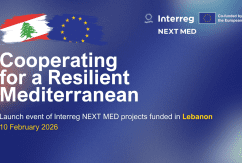Opinion Poll 2021 – Lebanon (factsheet)

Lebanon is the leading country in Mashrek in terms of subjective knowledge of the EU, and only comes second to Algeria in the broader Southern Neighbourhood region, with 61% confirming that they know what the EU is all about.
53% of Lebanese respondents have a positive image of the EU, and 56% believe that their country have a positive relationship with the EU. 61% of respondents in Lebanon believe that the EU partnership is important to the country.
Most respondents associate the EU to Human Rights with 84% of respondents mentioning it, followed by Democracy which was chosen by 80% of respondents and Social Justice, mentioned by 77% of respondents. Then came peace and stability and solidarity. In terms of awareness of EU cooperation, 81% in Lebanon mentioned the support to refugees and displaced people, followed by 62% who mentioned healthcare, 47% who mentioned social protection and 34% who mentioned civil society.
Areas in which the Lebanese respondents believe that they have benefited the most from EU support include healthcare with 51% of respondents, Humanitarian aid (40%), Civil Society (20%) and education and skills along with trade and investments which came in fourth and fifth with 18% of respondents choosing each of those. For 75% of Lebanese respondents, the EU should be more engaged in humanitarian aid, followed by health (71%) and education and skills (64%).
61% of Lebanese respondents were also aware of the EU’s response to the COVID-19 pandemic, and 83% of those aware of it also said that the support was effective.
This survey – part of a wave of opinion polls carried out in eight southern Neighbourghood partner countries – was conducted in Lebanon between July and September 2021, with 1,007 people consulted in face-to-face interviews. Respondents were asked about their general perceptions of the EU and the values with which it is associated, about EU relations with their country, and the impact of EU financial support, including in supporting their country’s response to the COVID-19 crisis. The surveys also look at preferred sources of information, how people feel about their personal situation and the situation in their country, and their expectations for the future.
Read more
Latest Publications
































 Syria
Syria 



